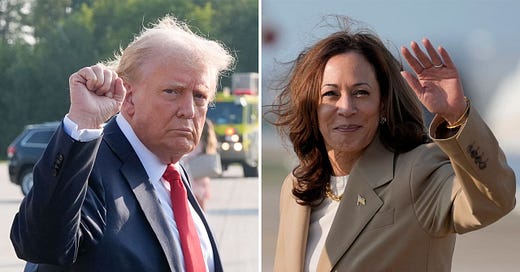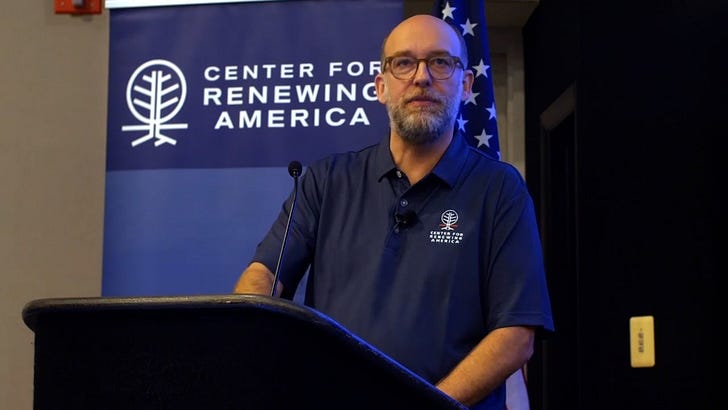Welcome to Our Last Pre-Election Day Newsletter
I’ve been down (but not out) with a case of “Rhinitis,” so the audio version this week is a brief statement that there is no audio version this week. Sorry. The fever, cough, sore throat, muscle aches, congestion, runny nose, and coughing every 15-20 seconds is not conducive to making an audio recording (or getting healthy). Thanks for your understanding.
Okay With Bigotry
While the argument could be made that Trump supporter and funny man Tony Hinchcliffe could not differentiate a political rally from a comedy show because a) much of what goes on at Donald Trump’s rallies is, in fact, funny, b) Hinchcliffe is not particularly discerning, c) the Trump campaign doesn’t know what it’s doing sometimes, or d), some other reason(s), it is clear that Hinchcliffe and those who cleared his speech beforehand thought that referring to Puerto Rico as “a floating island of garbage” was an effective way to appeal to Puerto-Rican Americans as well as to Trump’s bigoted leanings (Mexicans, Muslims, women, and well, anyone who is not Donald Trump.
Remember that one foundational premise of this newsletter and the book on which it is based is that the United States has a collective national Shadow; that Shadow is characterized by at least nine traits: ignorance, arrogance, fear, bigotry, violence, greed, excess, bullying, and untrustworthiness; and that Donald Trump embodies all nine traits. The threat that he poses to democracy and rule of law is obvious. The gift he offers, while less obvious, is as important. He has invited the nation’s Shadow to the surface. Tens of millions of Americans who cheer and vote for him now speak out in the mainstream. The danger is exposed.
Why Do You Vote As You Do?
And yet, not every one of those tens of millions cheer and vote for the same reasons: Some, like Steve Bannon, want to tear the government down; many others have funded Trump’s campaigns in the name of restoring God’s wish that the United States, as a white Christian nation, will spread democracy and Christianity across the globe; others, as has been exposed by the research and writing of folks like Thomas Frank (What’s the Matter With Kansas?, 2004) and Jonathan Metzl (Dying of Whiteness, 2019; What We’ve Become, 2024) continue to vote for Republican candidates and policies that make their lives more dangerous and more difficult—whether from habit, allegiance to various myths, to vincible ignorance, to some combination of these, or to something else altogether.
American Myth(s)
Christianity is one powerful myth (with its many iterations and contradictory claims and practices, especially its unhealthy group-centric, us. vs. them, love your neighbor and hate those other people approach that’s been embraced by Trump and his supporters). Beyond religion, historian Richard Slotkin offers us the Myth of the Frontier, the Myth of the Founding, the Liberation Myth, the “White Reunion” Myth, the Myth of the Lost Cause, the Myth of the Good War, and the Myth of the Movement—all of which deserve more attention than this brief mention here.
Money, Media, and Independence
Beyond the white Christian connection, however, lies the media, and those billionaires that own (some of) them, and those media companies that have chosen, shortly before the November 5, 2024 election, not to endorse any presidential candidate. On October 25 Jonathan V. Last (JVL) of the Bulwark referred to this choice—specifically as it pertained to Jeff Bezos and the Washington Post—as not a journalism story but a business story:
“Following Trump’s 2016 victory, the Post leaned hard into its role as a guardian of democracy. This meant criticizing, and reporting aggressively on, Trump, who responded by threatening Bezos’s various business interests.
And that’s what this story is about: It’s about the most consequential American entrepreneur of his generation signaling his submission to Trump—and the message that sends to every other corporation and business leader in the country. In the world.
Killing this editorial says, If Jeff Bezos has to be nice to Trump, then so do you. Keep your nose clean, bub.”
Two days later, on October 27, JVL dove deeper:
“When Bezos decreed that the newspaper he owned could not endorse Trump’s opponent, it was a transparent act of submission borne of an intuitive understanding of the differences between the candidates.
Bezos understood that if he antagonized Kamala Harris and Harris became president, he would face no consequences. A Harris administration would not target his businesses because the Harris administration would—like all presidential administrations not headed by Trump—adhere to the rule of law.
Bezos likewise understood that the inverse was not true. If he continued to antagonize Trump and Trump became president, his businesses very much would be targeted.”
Bezos responded generally to critics of his decision (not to JVL) via the Post’s opinion page in a piece entitled “The Hard Truth: Americans Don’t Trust the News Media”:
“Presidential endorsements do nothing to tip the scales of an election. No undecided voters in Pennsylvania are going to say, “I’m going with Newspaper A’s endorsement.” None. What presidential endorsements actually do is create a perception of bias. A perception of non-independence. Ending them is a principled decision, and it’s the right one.
….
“I would also like to be clear that no quid pro quo of any kind is at work here. Neither campaign nor candidate was consulted or informed at any level or in any way about this decision.
….
“When it comes to the appearance of conflict, I am not an ideal owner of The Post. Every day, somewhere, some Amazon executive or Blue Origin executive or someone from the other philanthropies and companies I own or invest in is meeting with government officials. I once wrote that The Post is a “complexifier” for me. It is, but it turns out I’m also a complexifier for The Post.
….
“You can see my wealth and business interests as a bulwark against intimidation, or you can see them as a web of conflicting interests. Only my own principles can tip the balance from one to the other. I assure you that my views here are, in fact, principled, and I believe my track record as owner of The Post since 2013 backs this up. You are of course free to make your own determination, but I challenge you to find one instance in those 11 years where I have prevailed upon anyone at The Post in favor of my own interests. It hasn’t happened.”
Some folks don’t like Bezos because they think he’s too rich and Amazon is too big. Others see him as a manifestation of (the material success piece of) the American Dream.
A careful read of both JVL’s two columns and Bezos’s opinion piece reveals that though they appear to be at odds, they can both be true, and you’ll have to read all three pieces with a Geiger counter checking your personal biases in order to see this.
What’s of more concern (at least for me) is that myriad factors contribute to the weakening and death of democracy. As Stephen Levitsky and Daniel Ziblatt warned us in their 2018 How Democracies Die:
“The process often begins with words. Demagogues attack their critics in harsh and provocative terms—as enemies, as subversives, even as terrorists.” (75)
….
“…the assault on democracy begins slowly….it may, as first, be imperceptible.” (77)
….
”It always helps to have the referees on your side….These include the judicial system, law enforcement bodies, and intelligence, tax, and regulatory agencies.” (78)
….
“Governments may also use their control of the referees to “legally” sideline the opposition media, often through libel or definition suits.” (83)“As key media outlets are assaulted, others grow wary and begin to practice self-censorship…. Elected autocrats also seek to weaken business leaders with the means to finance opposition” (84-85) JVL’s point above.
Whether you trust JVL or Bezos (or perhaps them both in this instance), refer to your checklist regarding the media, the judiciary, and business leaders at the very least. How are we doing?
Donald Trump has normalized lying, whining, and doubling down on his lies—even when, as during COVID, his lies and incompetence cost hundreds of thousands of American lives. He’s a convicted felon, and his influence on the judicial system, including the Supreme Court, has allowed him to get to November 5 without further convictions (and, perhaps, beyond that date, with immunity).
It is tiresome and necessary to repeat all this.
What About Kamala Harris?
In a more or less healthy society, everyone would vote for the lifelong public servant who has worked for the people as a district attorney, the Attorney General of California, a U. S. Senator from California, and the Vice President of the United States. No one would vote for a one-time President who lost the popular vote each time he ran, who had not served the public prior to his presidency, and who has not served the public since.
In a more or less healthy society, that is.
I’ll leave you with a thoughtful, honest, wise response from a true “elder” (still with some good edginess) in the world of professional sports.
Gregg Popovich on Donald Trump. Despite the YouTube headline that’s designed to get clicks, Popovich’s comments were mostly thoughtful, honest, and wise:
Our recommendation and something to consider departments are closed this week for rhinitis. We’ll be back. Thanks for understanding.
Sources (see newsletter for more detail):
Richard Slotkin, A Great Disorder: National Myth and the Battle for America, (Belknap-Harvard UP, 2024), 3, 12-14. Slotkin delves into a history of each of these myths, and then shows how they have been used in the “culture-war politics of the last fifty years.”
Jonathan V. Last, “The Guardrails Are Already Crumpling,” The Bulwark, October 25, 2025.
See also Aaron Mak, “A Brief List of the Times Donald Trump Tried to Punish Jeff Bezos,” Slate, April 24, 2020, https://slate.com/technology/2020/04/donald-trumps-attempts-to-punish-amazon.html?pay=1730228170223
Jeff Bezos, “The Hard Truth: Americans Don’t Trust the News Media,” Opinion, Washington Post, October 28, 2024, https://www.washingtonpost.com/opinions/2024/10/28/jeff-bezos-washington-post-trust/
Steven Levitsky, and Daniel Ziblatt, How Democracies Die, (Broadway, 2018), 75, 77-78, 83-85.














Share this post